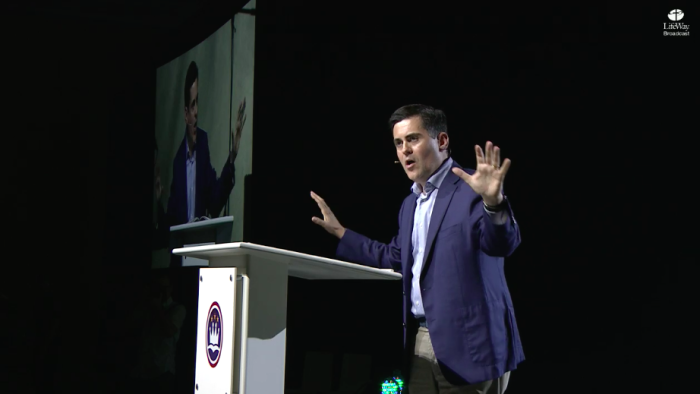Russell Moore warns against downplaying 'awful' nature of Hell to non-believers

Southern Baptist ethicist Russell Moore has stressed the horrific nature of Hell and cautioned Christians against downplaying the reality and severity of Hell to appear “more loving” to non-Christians.
In a recent video posted on his website, Moore said Hell has been “trivialized” in today’s culture — or simply avoided altogether. He offered three reasons many professing believers refrain from thinking about or discussing the doctrine of Hell.
“Sometimes that's because they're embarrassed about seeming to be ‘hellfire and brimstone’ to the people in their communities, as though somehow we were more compassionate than God,” he suggested.
“For a lot of other people though, there's just a gravity of it all. We can think of people we know who don't know Christ, and there's a burden there when it comes to the doctrine of Hell,” he continued.
“And then for other people, there can be legitimate questions. They can say, ‘Why would somebody who's rebelling against God in this short little period of time ... then endure Hell forever and ever and ever and ever with no end in sight?’”
However, throughout His earthly life and ministry, Jesus repeatedly talked about Hell and used a variety of different forms of imagery to describe the awfulness of Hell and judgment, Moore stressed.
Deep within their heart, every human understands the necessity of justice and judgment, he said, adding, “We have a longing for love and we have a longing for justice. And that's present in everyone. That's why sometimes it's hard for people to forgive.”
The first thing to understand about Hell is that “sin is more serious than we think it is,” Moore stressed.
“A sin is not just about the consequences of the way that we relate to one another. Sin is a violation of the holiness of God,” he said. “And we don't understand that. Of course we don't because we're finite. But also because we're sinners. We're implicated in this cosmic rebellion against God, but also because of the nature of the punishment itself.”
Those condemned to Hell will be completely cut off from God and “handed over” to who they truly are, apart from His grace, Moore posited.
“We can't imagine that because we live in a universe where God's grace is hemming us all around,” he said. “That common grace that is all around us, that is removed. And so we're in a situation where the judgment of God comes at us full strength.”
Instead of shying away from the topic of Hell or “substituting human wisdom” for biblical truth, Moore stressed the need for Christians to “persuade people” to be “reconciled to God,” citing 2nd Corinthians 5 and 6.
“It ought to cause us to see our own complicity as sinners, which ought to cause us to see the goodness and the magnificence of grace,” he explained.
Through the death of His son, God provided a way to escape Hell and remain with Him in “perfect communion forever,” Moore said.
“The doctrine of Hell is a true doctrine,” he concluded. “God has warned us of this and we need to be the people who understand Hell is awful. Hell is unending, Hell is completely avoidable.”
Hell is one of the most controversial doctrines within Christianity. A 2016 survey from LifeWay Research found that only 4 in 10 Americans believe Hell is where God sends all people who do not accept Christ as their Savior. In contrast, 6 in 10 Americans believe all people are reunited with loved ones in Heaven.
In an op-ed for The Gospel Coalition, pastor and author Joe Carter argues that one “cannot believe in the Jesus of the Gospels and not believe in Hell.”
“Jesus doesn’t give us that option,” he writes. “You can also not love your neighbor and be apathetic about their spending eternity in Hell. Jesus doesn’t give us that option either. If we believe Jesus and love our neighbor we will bring the doctrine of Hell back into our churches.”
Pastor and author J.D. Greear notes that while people often feel that Hell is “some great blemish on God’s love,” Hell actually shows us the extent of God’s love in saving us.
“Why did Jesus speak about Hell more than anyone else in the Bible? Because He wanted us to see what He was going to endure on the cross on our behalf,” Greear said.
“Hell magnifies for us the love of God by showing us how far God went, and how much He went through, to save us.”




























